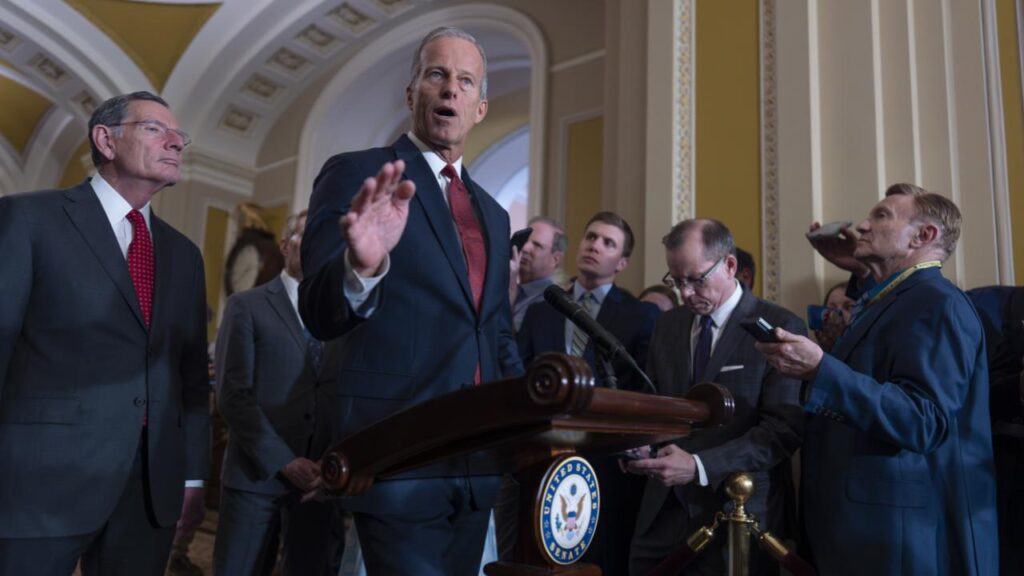Republicans are staring down one of their biggest political tests in years. As the Senate nears a final vote on Donald Trump’s sweeping “One Big Beautiful Bill,” party leaders face open rebellion from a handful of GOP senators—threatening to blow up the legislation and split the party down the middle.

The Final Senate Vote on Trump’s Mega‑Bill Could Split the Party
With days to go before the final vote, the stakes couldn’t be higher for Senate Republicans. They’re not just voting on Trump’s bill—they’re deciding whether to lock arms or walk away from his agenda. What happens next could define not only the GOP’s future, but the country’s fiscal direction for the next decade.
What’s Inside Trump’s Mega‑Bill?
Nicknamed the “One Big Beautiful Bill” by the former president himself, the legislation is an ambitious—and controversial—attempt to lock in major parts of the GOP economic agenda. Here’s what it does:
- Extends 2017 tax cuts permanently, including corporate and high-income breaks.
- Tightens Medicaid and SNAP access, prompting fears of coverage loss for millions.
- Slashes clean energy incentives—a rollback of many Inflation Reduction Act credits.
- Pumps $350 billion into border and national security programs.
- Raises the cap on state and local tax (SALT) deductions from $10,000 to $40,000.
Altogether, it reshapes nearly $4 trillion in taxes and spending over the next decade, according to analysts.
Where the GOP Is Cracking
Though Republicans hold 53 seats in the Senate, internal divisions have made this vote anything but easy.
- Sen. Thom Tillis (R-NC) and Sen. Rand Paul (R-KY) voted no on the initial procedural motion, warning of fiscal irresponsibility and damage to the social safety net.
- Sen. Ron Johnson (R-WI) joined them ahead of the final vote, citing concerns over clean energy cuts and deficit spending.
- Others, like Sen. Josh Hawley (R-MO) and Sen. Lisa Murkowski (R-AK), flipped to yes after personal appeals and bill tweaks.
Behind the scenes, Trump has personally lobbied reluctant senators, hosting them at Mar-a-Lago and even joining a few on the golf course to make his pitch. “I’ve covered plenty of legislative nail-biters—but the arm-twisting I’m seeing here is next-level,” said one Hill staffer, who asked not to be named.

Senate Vote Timeline
The full Senate debate is now underway, with a 20-hour session followed by a chaotic “vote-a-rama”—where any senator can offer an amendment, and votes happen rapid-fire.
The GOP leadership is aiming to pass the bill before July 4, in line with Trump’s personal deadline and to avoid new fiscal battles tied to the debt ceiling.
If passed, the bill heads to the House of Representatives, where Republicans are expected to largely support it, though procedural adjustments may send it back to the Senate one more time.
Clean Energy Cuts Raise Red Flags
Environmental groups warn that the rollback of solar, wind, and EV incentives could stall progress toward emissions goals, cost over 500,000 clean energy jobs, and raise household energy prices. “The bill would reverse the clean energy momentum we’ve built since 2021,” wrote Evergreen Action in a policy alert. “It’s a climate and economic disaster.”
Trump’s Legacy—or the GOP’s Gamble?
To Trump, the bill is a legacy-defining moment: a chance to cement his economic policies in law, project unity ahead of the 2024 election, and draw a clear contrast with Democrats.
But for many Senate Republicans, it’s also a political gamble.
Senators from purple states worry the cuts to Medicaid and food stamps could backfire with suburban voters. Meanwhile, fiscal hawks are alarmed by a projected $3.3 trillion increase in the federal deficit, per internal estimates.
FAQs
Why is the GOP divided?
The bill combines tax cuts with major spending rollbacks, putting moderates and deficit hawks at odds with each other—and with Trump.
What’s a “vote-a-rama”?
It’s a Senate tradition during budget bills where any senator can force votes on endless amendments. It’s chaotic but often shapes the final version.
Could the bill fail?
Yes. If just three Republican senators defect, the bill dies. The current vote count is razor-thin.






